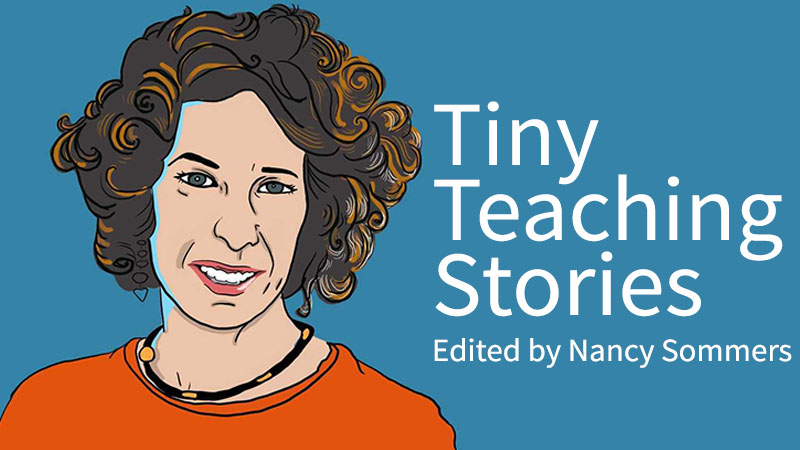-
About
Our Story
back- Our Mission
- Our Leadershio
- Accessibility
- Careers
- Diversity, Equity, Inclusion
- Learning Science
- Sustainability
Our Solutions
back
-
Community
Community
back- Newsroom
- Webinars on Demand
- Digital Community
- The Institute at Macmillan Learning
- English Community
- Psychology Community
- History Community
- Communication Community
- College Success Community
- Economics Community
- Institutional Solutions Community
- Nutrition Community
- Lab Solutions Community
- STEM Community
- Newsroom
- Macmillan Community
- :
- English Community
- :
- Bits Blog
- :
- Bits Blog - Page 2
Bits Blog - Page 2
Options
- Mark all as New
- Mark all as Read
- Float this item to the top
- Subscribe
- Bookmark
- Subscribe to RSS Feed
Bits Blog - Page 2
Showing articles with label Literature.
Show all articles
Author
10-21-2022
07:00 AM
Today's Tiny Teaching Story is by Lauri Mattenson. Lauri is a Lecturer with UCLA Writing programs. Holding Zoom Space She’s sitting in her empty bathtub, laptop propped up on a stack of towels, because there’s no room anywhere else in the apartment. He’s in his garage using his neighbor’s wifi. She’s on academic probation and never submitted a draft. They are using a laptop with seven missing keys and a cracked screen. He hasn’t had a good night’s sleep in two weeks. She’s taking care of three little sisters during class. He’s the only Covid-negative person in a household of six. They are working 25 hours a week while going to school full-time. We’re weary, but we’re all here. Submit your own Tiny Teaching Story to tinyteachingstories@macmillan.com! See the Tiny Teaching Stories Launch for submission details and guidelines.
... View more
Labels
0
0
1,080
Author
09-30-2022
07:00 AM
Today's Tiny Teaching Story is by Jennifer Smith Daniel, Director of Writing Center and Writing Across the Curriculum Programs at Queens University of Charlotte. Restoring Your Tongue... Earlier in the Center, you’d encouraged a first-year with her assignment. Then sat in the comfy red chair of my office as essential oils penetrated our masks to cry out your anger at the professor who commented on your writing with his elitist, prescriptive perspective. He never learned the story of how your family stopped speaking Spanish at home because you didn’t get registered for preschool after migrating from Mexico. Later, I stood in the front our class as another white women teacher and offered you Anzaldúa. You found restoration in the new word - Chicana. Submit your own Tiny Teaching Story to tinyteachingstories@macmillan.com! See the Tiny Teaching Stories Launch for submission details and guidelines.
... View more
Labels
1
0
1,123
Author
09-26-2022
10:40 AM
Today’s guest blogger is Kim Haimes-Korn, a Professor of English and Digital Writing at Kennesaw State University. Kim’s teaching philosophy encourages dynamic learning and critical digital literacies and focuses on students’ powers to create their own knowledge through language and various “acts of composition.” She likes to have fun every day, return to nature when things get too crazy, and think deeply about way too many things. She loves teaching. It has helped her understand the value of amazing relationships and boundless creativity. You can reach Kim at khaimesk@kennesaw.edu or visit her website: Acts of Composition Overview [Generational] cohorts give researchers a tool to analyze changes in views over time; they can provide a way to understand how different formative experiences interact with the life-cycle and aging process to shape people’s view of the world. (Pew Research 2020) This post is the first in a three-part series through which I detail a rather expansive Generation Project with multimodal components and sub-projects. I broke down the project into concurrent parts that can also be used as stand-alone activities. Stay tuned as I present these assignments over the next couple of posts. In this first post, I present the project overview and the historical context, the second post I detail the popular culture component and the third is the collaborative presentations. These assignments are easily modified for all teaching modalities (online, f2f, and hybrid). Image of timeline between 1962 and 1966 with events placed This series demonstrates that we can integrate multimodal composition in thoughtful ways throughout assignments and processes and is not just about end products. In designing this project, I imagined something that involved students in deep research – both individual and collaborative – on a subject that is interesting and current. I wanted to offer opportunities throughout the project to engage in multimodal work – both the analysis and composition of multimodal artifacts. Students house the project on individual websites created through Google Sites to allow for composing and sharing of interactive and visual content. Generation Project Overview This generation project helps students move beyond their insular views and challenges them to understand the perspectives of others by immersing themselves in generational research. We live in a society with polarized discourse and this project will help students engage with ideas outside of their generational space. These ideas motivated me to design this generation project in which students work together to research one of the five living generations: The Silent Generation (born 1928–1945) Baby Boomers (born 1946–1964) Generation X (born 1965–1980) Millennials (born 1981–1995) Generation Z (born 1996–2010) Students research both primary and secondary sources to define and create a portrait of their assigned generation. The purpose is to understand the historical context, popular culture artifacts, values, and cultural ideologies. Each student will individually research a couple of focus years within the generation and then contribute to a collaborative project in which they overview and interpret the generation. Sources: Students will locate and analyze the following scholarly and popular sources: Historical context (timelines, historical portraits, economy, values, important figures, oral stories, theoretical perspectives, etc.) Media and Popular culture artifacts (images, music, advertisements, literature, film, fashion, food, etc.) Defining Moments (Headlines, Articles) Ideologies, ideas, behaviors, and values of the time Anything else that might be meaningful Steps to the Assignment This first part of the assignment orients students towards generational research and introduces them to definitions of the five living generations. 1. Background Resources: Understanding Generational Research It is important for students to understand the nature of generational research and gain a general overview of the generations. This helps them understand the ways generations are constructed and the trends that affect them. I allow students to choose the generation research group they want to join so these background readings help them make those choices. Generation Research Resources: The Whys and Hows of Generational Research Pew Research Center (2020) Generations Throughout History – Buzzfeed Video (2017) Fast Facts: American Generations – CNN (2022) Baby Boomers, Millennials, Gen X Labels: Necessary or Nonsense The Conversation (2020) 2. Online Discussion - Students engage in an online discussion in which they choose a passage, idea or related ideas from the generation readings. I encourage them to speak about the characteristics they observed along with assumptions and stereotypes they might have about the different generations. I require them to also post one representative image (from Creative Commons or other copyright free sources). 3. Choose a Generation and Focus Years – After the initial background work, students choose the generation that they want to research as part of a team. I try to make sure that the groups are evenly distributed to have the same number of members. Students assemble in their teams (online or f2f) and then choose a couple of focus years within their generations. The focus years give students responsibility for individual research that they will contribute to their research team to create a representative span of their generation years. 4. Research Historical Context: Students compose an Historical Overview of their focus years. They should include events, defining moments, trends, important figures and ideas, observations about politics, economy and values. I encourage them to go beyond just listing facts and interpret and synthesize their findings. They search for academic and popular articles and learn how to attribute their sources. 5. Interactive Feature Article: Students compose their historical overview of their focus years as an interactive document that includes specific references, purposeful embedded links, and captioned multimodal components (images, video clips, etc.) to tell their stories and contextualize their research. They create a page on their site to host the post. 6. Teamwork: Defining Moments: Students get together with their teams and share their research. Each team creates a Google doc in which they list the defining moments and significant events of their focus years. Together, they discuss the overlaps and the ways their focus years fit together to define their generation. 7. Interactive Timeline: Data Visualization: As a team, students select the most important defining moments from their extensive list and create a multimodal timeline. There are many open-source platforms for creating interactive and visual timelines. I give them some resources but allow them to choose their own. They will include the defining moments along with representative images for each entry on the timeline. They will also use this timeline as part of their collaborative presentation later in the project. Some timeline resources: Best Free Timeline Maker Tools for Students Timelines in Canva Adobe Timeline Creator Reflections on the Activities This generation project gives each student a research role and ways to contribute to the larger community knowledge on the subject. The level of individual responsibility creates genuine research teams that invite strong analysis and synthesis through collaboration. These activities engage students in a range of research, writing, and multimodal composition practices. I find that when students are asked to engage in meaningful curiosity and collaboration, they demonstrate a stronger sense of ownership and motivation. Stay tuned – next post – Part 2: Generations through Popular Culture
... View more
Labels
-
Composition
-
Literature
0
0
2,627
Author
09-09-2022
07:00 AM
Today's Tiny Teaching Story is by Pamela Childers, a lifelong secondary, undergraduate and graduate school educator, writer, editor, and consultant. She enjoys collaborating with colleagues and students. My First Teacher Letitia, my Welsh Grammie, took me at three to the circus in Philadelphia, while Mother worked at a switchboard and Dad was still overseas after the war. She read me poetry and prose long after I had started teaching English and recited Shakespeare for the Princeton Women’s Club in her late seventies, an age I am close to reaching. When I last visited her in the dementia ward of the nursing home, she looked up at me from her wrinkled pillow, smiled and said, “I raised you, didn’t I?” I nodded, and we both shared an unforgotten memory. Submit your own Tiny Teaching Story to tinyteachingstories@macmillan.com! See the Tiny Teaching Stories Launch for submission details and guidelines.
... View more
Labels
1
1
1,417
Author
08-19-2022
07:00 AM
Today's Tiny Teaching Story is by Rhona Blaker. Blaker is an adjunct instructor of English at Glendale Community College, where she also serves as the Campus Coordinator for Contexualized Teaching and Learning. From the Pantry Most mornings I stare at my own face next to twenty-five black squares. One Thursday, desperate for human contact, I begged the students to reveal their faces. Three students complied. Later, a young woman e-mailed to say she never turns her camera on because she takes class on a tablet while sitting in a pantry, trying to escape the ten other people who live in her apartment. I apologized for imagining English 101 was ever about me and rejoiced when she later wrote to say she had been accepted to UCLA after earning a 4.0 GPA in her community college closet. Submit your own Tiny Teaching Story to tinyteachingstories@macmillan.com! See the Tiny Teaching Stories Launch for submission details and guidelines.
... View more
Labels
1
3
1,763
Author
07-29-2022
07:00 AM
Today's Tiny Teaching Story is by Dr. Meridith Leo. Leo teaches courses in Composition and Rhetoric as well as Creative Non-Fiction at Suffolk County Community College’s Ammerman Campus. Dr. Leo earned her Ph.D. at St. John’s University where she focused on narratives of difference and belonging along with culturally responsive literacy narratives. Her research at St. John’s University led to work in Co-Requisite (ALP) coursework which is detailed in her dissertation “Integrating Emerging Writers into the Post-Remedial College: A Consideration of Accelerated Learning Programs.” No Sleep, Only Teach Ding. It's 3 am. I should be sleeping but I'm not. That's the 3rd email from Katia. Ding. There goes another email. It's Jeremiah this time. Do I get up? The emails will just keep coming; they're awake. I guess it's time to start the day. Computer on. Login complete. Virtual meeting links sent. Black tiles slowly fade to Katia and Jeremiah. "Good morning. What's going on?" My voice is cracking as it wakes. Simultaneously I hear: "We need help with our essays!" Through a yawn, I manage to say, "Okay let's see what we can work through. Don't worry. We'll figure it out." Submit your own Tiny Teaching Story to tinyteachingstories@macmillan.com! See the Tiny Teaching Stories Launch for submission details and guidelines.
... View more
Labels
0
2
2,029
Author
07-08-2022
07:00 AM
Today's Tiny Teaching Story is by Carmen Misé, Assistant Professor of English and Communications at Miami Dade College - North Campus. Misé is an insatiable reader and greatly enjoys film. Her favorite genre is horror (mystery, suspense, thrillers, sci-fi). She writes non-fiction and poetry, enjoys being outdoors and spending time with family, friends, and her dog Hamlet. Misé just became a first-time mom. She believes in aliens, and yes, the Earth is round. Hello! As I logged into Blackboard Collaborate Ultra, using the recommended browser, and triple checking my Internet connection, I instantly dreaded the sea of silence in our “classroom.” The silhouettes of “users.” No faces, no voices. I felt like that one time I shouted, “Hello!,” as I stood at the Grand Canyon's South Rim. My salutation echoed through time and space, but I did not know its end destination or if anyone heard me. That day would be different. We laughed and talked about our favorite local restaurants. I met everyone's cat. We didn't cover thesis statements, but I was OK with that. Submit your own Tiny Teaching Story to tinyteachingstories@macmillan.com! See the Tiny Teaching Stories Launch for submission details and guidelines.
... View more
Labels
2
3
2,546
Author
06-17-2022
07:00 AM
Today's Tiny Teaching Story is by Dr. Nancy E. Wilson, Associate Professor and Directory of Lower Division Studies at Texas State University. Epiphanies Asked to share an epiphany, Misha mentions that while watching a YouTube video of a KKK grand wizard, she recognized that they had something in common: as an African American, she also wishes to preserve her racial heritage. When the class expresses alarm, Misha clarifies that she knows about the KKK’s hatred of African Americans; however, during quarantine she resolved to stop condemning and canceling others. Doing so made her feel superior but left her ignorant. She suggested that as a class we “run toward” uncomfortable topics and try to understand why people think what they think. Every class needs a Misha. Submit your own Tiny Teaching Story to tinyteachingstories@macmillan.com! See the Tiny Teaching Stories Launch for submission details and guidelines.
... View more
Labels
1
2
2,077
Author
05-27-2022
07:00 AM
Today's Tiny Teaching Story is by Jenna Morton-Aiken, Assistant Professor at the Massachusetts Maritime Academy. Voices Day 1: Welcome to Technical Writing. I cultivate tone and words to establish authority with young, mostly male, maritime cadets. Call me Dr. Their body language shouts, Stop trying, your class doesn’t matter to me. Weeks 1-3: Deploy resistance with strong voice and applied expertise as Covid-19’s shadow grows. Maybe this doesn’t suck, white gaps between double-spaced submissions whisper. Week 4: Campus abandoned, we’re all silenced. Week 5+: I’m here, I write with memes and raw emotions, my voice virtually transformed. Theirs, too—Help me, they say. I’m drowning, they say. Your words matter to me, they say. We write. Submit your own Tiny Teaching Story to tinyteachingstories@macmillan.com! See the Tiny Teaching Stories Launch for submission details and guidelines.
... View more
Labels
1
1
2,045
Author
05-06-2022
07:00 AM
Today's Tiny Teaching Story is by Dr. Chris M. Anson. Chris is a Distinguished University Professor at North Carolina State University, where he is also the Director of the Campus Writing & Speaking Program. Boot Camps and Boot Straps Four years after I taught him in a federally-funded pre-college summer program for inner-city kids who some high school teacher saw a spark in—otherwise doomed never to go to college—we crossed paths on the campus just before graduation. "Cool Chris!" he yelled—the name the students had given me in that summer writing course. "Tyrone! What's up?" We high-fived. "I got into Harvard Law!" he said with a broad smile, "and you helped, man!" A story of triumph—his, and my small piece of it. But what's wrong with us that so many live on the margins . . . and of those, with such slim chances? Submit your own Tiny Teaching Story to tinyteachingstories@macmillan.com! See the Tiny Teaching Stories Launch for submission details and guidelines.
... View more
Labels
1
0
1,121
Author
04-15-2022
07:00 AM
Today's Tiny Teaching Story is by Jennifer Gray, Professor of English and Director of the Writing Center at the College of Coastal Georgia. Video Conference The student requested a video conference on Easter Sunday at 4pm. I said yes, because it was what he selected. I grumbled privately, as it was the only day without something work-related scheduled. I left celebrations at my neighbor’s house, much to our dismay, and logged in, expecting a blank black box. Instead, there he was, with a smile, a Zoom wave, and his Walmart uniform and nametag, calling from the front seat of his car on his break during his shift on a holiday. We talked about our assignment. He revised his citing practices, and I revised my negativities. Submit your own Tiny Teaching Story to tinyteachingstories@macmillan.com! See the Tiny Teaching Stories Launch for submission details and guidelines.
... View more
Labels
2
0
1,057
Author
04-01-2022
07:00 AM
Today's Tiny Teaching Story is by Lisa Lebduska, Professor of English and Director of College Writing at Wheaton College. Observations As a grad student adjuncting at 3 schools, I always ran late. One rainy day, I flew into my office, changed into dry shoes, then rushed to class. When class ended, a student was waiting for me. "We just wanted you to know," she said, "that we noticed you are wearing two different shoes." I looked with horror from the beige wedge on my left, to the black pump on my right. "Why didn't anyone say anything?" "We thought it was another one of those exercises where you were trying to see if we were paying attention to details… We were." Submit your own Tiny Teaching Story to tinyteachingstories@macmillan.com! See the Tiny Teaching Stories Launch for submission details and guidelines.
... View more
Labels
2
0
986
Author
03-18-2022
07:00 AM
Today's Tiny Teaching Story is by Sonia Feder-Lewis, a Professor at Saint Mary's University of Minnesota's Graduate School of Education. Awakening It was a dream course assignment: a small upper-level honors class in Women’s Literature. A reward near the end of graduate school. Eleven students: 10 women and one brave young man, newly separated from the Army for carefully undisclosed reasons. The women treated him gently as we read Woolf, Morrison, Erdrich, Chopin. “The Awakening is the greatest book I have ever read,” he said passionately. Two decades later, he recognizes me in a coffee shop. Without pause, he tells me the course had been his favorite. And his hardest. I do not ask why. Submit your own Tiny Teaching Story to tinyteachingstories@macmillan.com! See the Tiny Teaching Stories Launch for submission details and guidelines.
... View more
Labels
1
0
1,242
Author
02-18-2022
07:00 AM
Today's Tiny Teaching Story is by Pamela Childers, a lifelong secondary, undergraduate and graduate school educator, writer, editor, and consultant. She enjoys collaborating with colleagues and students. Student Teaching “Go wash your mouth out with soap!” And he did. The 8th grader returned to our grammar lesson in progress, raised his hand, and bubbled out the next answer. In Biology class, I distributed apples and asked, “Who can identify the internal parts you just dissected?” And they all did, delighted to eat their half apples. Rushing to my senior English class to discuss the Romantic poets, I passed a student at his open locker pulling out a knife. “May I have that, please?” And he handed it to me. Things were much different in 1965, I have learned. Submit your own Tiny Teaching Story to tinyteachingstories@macmillan.com! See the Tiny Teaching Stories Launch for submission details and guidelines.
... View more
Labels
1
0
1,163
Author
01-14-2022
07:00 AM
Today's Tiny Teaching Story is by Michelle Graber, Instructor of English and Communications at Mitchell Technical College. Superheroes Students sit six feet apart – eyes beaming up at me expectantly, masks askew. I’ve never noticed so many of my students’ eyes: shades of blue, brown, green, and hazel. I wonder what the rest of their faces look like, this sea of superheroes tolerating the mandated masking of their identities for the sake of public approval. Wow. I’m teaching superheroes. I face the class during the pandemic peak and push them through their studies. One student raises his hand to ask a question, and I find myself contemplating Charlie Brown’s problems understanding his teacher. She must’ve been wearing a mask, too. “A little louder, please,” I say, trying to resist leaning forward to hear better as I meet the grass-green orbs of the student whose name I can’t associate with a face and whose words I cannot hear. Submit your own Tiny Teaching Story to tinyteachingstories@macmillan.com! See the Tiny Teaching Stories Launch for submission details and guidelines.
... View more
Labels
3
0
1,301
Topics
-
Bedford New Scholars
42 -
Composition
238 -
Corequisite Composition
33 -
Developmental English
31 -
Events and Conferences
18 -
Instructor Resources
6 -
Literature
40 -
Professional Resources
7 -
Virtual Learning Resources
4
Popular Posts








